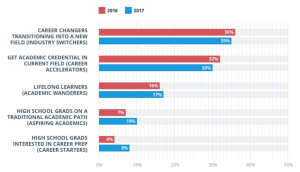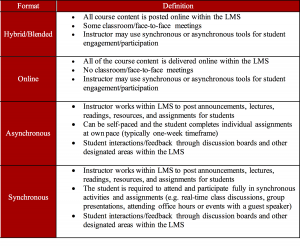As noted in Part One of this series, a growing number of colleges and universities are adding online learning opportunities to their course offerings, especially for part-time students. In addition, more and more students are turning to online learning as a way to fit their educational goals into their busy, professional lives.
For many online students, job and employment goals play an important role in their decision to pursue online learning opportunities. Seventy-three percent of online students reported that job and employment goals are the most important reasons for enrolling in an online program, according to this 2018 survey published by Best Colleges.com
Whether they are “Industry Switchers,” students transitioning to a new career (35%), or “Career Accelerators,” students who want to strengthen their professional skills and credentials (30%), students report that online learning offers them the best opportunity to advance their career on a schedule that fits their lifestyle.
But is online learning right for everyone? In this post we will look at some characteristics of online learners to help you determine whether an online learning environment is the right choice for you.
Characteristics of Online Students:
Depending on the format of the online program, students who interact and participate in an online learning environment require a different set of characteristics and study habits to ensure academic success than their counterparts in a more traditional, classroom-based environment.
To see if you have what it takes, ask yourself these questions:
Am I self-disciplined and self-motivated?
Unlike a classroom-based environment in which the instructor meets with students once or multiple times a week, most of the learning activities and communication in an online course are asynchronous, or self-paced. Students can participate and complete online assignments without any time or place constraints. In an online learning environment, consequently, it is possible for students to complete their course work at a time and place that is convenient for them.
However, with increased flexibility comes greater responsibility. Without the structure of the traditional classroom environment, online learners must be disciplined and self-motivated to keep up with the pace of the online course and complete all assignments on time.
Am I able to commit and set aside time each week for my online course(s)?
Online courses often require at least as much, if not more, time and commitment than classroom-based courses. Online courses, on average, require 10 to 12 hours of time per week for a three-credit course. While there is greater flexibility around when to complete an assignment within a given week, there is rarely time to procrastinate in an online learning environment. Before enrolling in an online program, make sure you can set aside enough time each week to keep up with your assignments.
Do I have good communications and writing skills?
In online courses, nearly all communication is written, so it is critical that you feel comfortable expressing yourself in writing to the instructor and your classmates. Find out how much writing is required and consider ways to improve your writing skills, such as working with a tutor, if necessary, before enrolling in an online course.
Will I miss the interactions of the classroom experience?
Depending on the course, the level of interaction between the student and instructor can vary in the online learning environment. Online learning is often supported by a Learning Management System (LMS). Depending on the LMS students will have a number of tools to engage and communicate with their instructor and classmates such as threaded discussions, email, and web meetings. Before the start of the course, refer to the syllabus to determine the instructor’s expectations regarding participation and assignment guidelines. The carefully consider whether the tools available suit your interaction style and will help you meet the instructor’s expectations.
Am I comfortable using a computer?
Regular access to a reliable computer and internet connection is essential for any online learning program. You do not need to be a computer guru to be successful, however, you do need to have some basic technology skills, such as word processing, using a web browser, and downloading and installing software or hardware needed to meet the course requirements. Additionally, you should be comfortable navigating the LMS, uploading files for assignments, and participating in online discussions which are a significant part of the online learning experience.
After reflecting on your answers to these questions, you should be able to determine if an online learning environment is right for you. Keep in mind that while the online learning environment provides a number of advantages and is becoming increasingly popular among colleges and universities as well as employers, your own learning preferences and lifestyles should determine the ideal learning environment for you. If you are self-disciplined, have strong written communication skills, can set aside a sufficient amount of time each week and are comfortable using a computer and interacting with peers online, then an online learning environment might just be right for you. If so, why not give it a try?
About the Author
Ke’Anna Skipwith is the Director of Online Learning in the College of Professional and Continuing Education at Wentworth Institute of Technology. She holds a MS in Learning Technologies from Drexel University and is pursuing her Ed.D at Northeastern University in Higher Education Administration. She is a member of EDUCAUSE and the University Professional and Continuing Education Association (UPCEA). Ke’Anna is also the co-author of the book: Best Practices in Engaging Online Learners Through Active and Experiential Learning Strategies (2017).
References:
BestColleges.com. (2018). Annual Trends in Online Education.
https://www.bestcolleges.com/perspectives/annual-trends-in-online-education/ Accessed April 26, 2018.
 reau of Labor Statistics, the average American will change jobs 10-15 times over the course of their working life. That’s a new job, every 5 years.
reau of Labor Statistics, the average American will change jobs 10-15 times over the course of their working life. That’s a new job, every 5 years.








